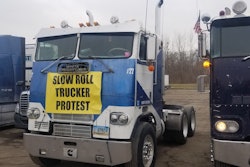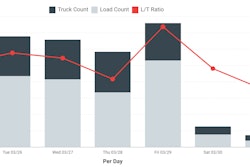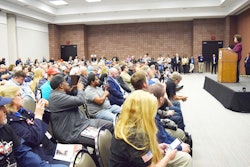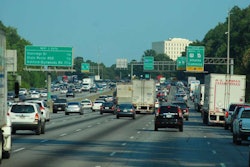Are you shutting down April 12 with those calling for protest?
Chi-Town Large Cars club cofounder Kris Santoianni heard the early calls for a shutdown April 12. “I put it out to club members when folks first started talking about it,” he says. For many members, it presented an opportunity for a meet-up beyond Chi-Town Large Cars’ annual truck show, their principal gathering.
“I guess we’ll mess my house up,” Santoianni told them at the time. When Overdrive spoke with him the afternoon of April 11, he was headed that way at the tail end of a run in the 1999 Peterbilt 379 he drives for a two-truck owner leased to an 18-truck carrier. “We have members coming in from all over the place, probably 20-30 people from out of town.” He planned a visit to a local grocery after he arrived back home to stock up for what will essentially be a party, plenty of time to talk, swap stories and ideas, and make a day and more of it.
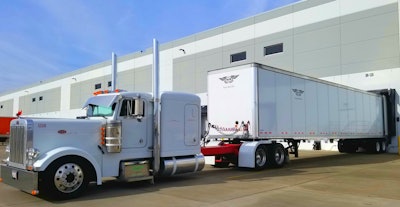 The 315-inch-wheelbase 1999 379 Santoianni hauls in got a bit of an update just this past weekend with new “cab and sleeper panels, new front fenders and rear fenders,” and more, he says.
The 315-inch-wheelbase 1999 379 Santoianni hauls in got a bit of an update just this past weekend with new “cab and sleeper panels, new front fenders and rear fenders,” and more, he says.Santoianni views any effectiveness of this shutdown as having the potential to demonstrate some unity among drivers, whose voices in regulatory and industry discussions don’t always rise to the top.
At the same time, it’s clear the Federal Motor Carrier Safety Administration and/or Congressional reps have heard them in recent years, having acted in some ways on principal driver concerns. An hours of service reform package is in the works, a new pre-CDL training requirement (though without firm behind-the-wheel time commitments) is being implemented next year. A bill is on the table in the House to exempt small fleets from the ELD mandate. A National Coalition on Truck Parking is raising priorities of governments all around the nation with regard to parking issues. More of an open-door policy at FMCSA under current leadership for drivers has spurred many into action as advocates, taking meetings, establishing rapport, and making issues clear.

Small fleet owner Daniel Davidson has not shut his approximately 20-truck business down, but did leave it up to drivers as to whether they wanted to participate. “I’ve got five guys shut down,” he says, though he was skeptical numbers would be sufficient enough to make any kind of big statement. He’s looking ahead to October and the planned second edition of “That’s a Big 10-4 on D.C.” on the National Mall, personally.
For Santoianni and others, though, the shutdown is not all about government-engagement efforts. “Freight’s taken a beating” this slow season, with the typical Spring uptick not exactly showing signs of arrival, he says. “The money’s taken a beating. Not 10 minutes ago I got a call from another guy getting ready to sell everything and find a company job,” he adds on an owner-operator friend.
That friend, for certain, is not the only one he knows who is struggling to stay afloat.
He hopes enough people participate that “strength in numbers” is the ultimate result. If Overdrive online polling conducted yesterday and into today — not a scientific sampling, of course — is any indication of levels of participation, 4 in 10 readers are joining in on the calls to take the day for themselves and/or trucking writ large. Results above were current as of the morning of April 12.
There’s reason to doubt that they’re a reflection of the entire industry. Not one of six drivers interviewed at at the Binghamton, N.Y., Love’s the afternoon of April 11 had even heard about the calls for a shutdown.
Among them was owner-operator Mark Eseltine of Champlain, New York, about as far north as you can go before crossing into Quebec, Canada on Interstate 87. He had loaded in Pittston, Pennsylvania Thursday morning with energy drinks and was headed to Colchester, Vermont. He echoed Santoianni’s thoughts about the freight market, in some ways. “Half of our problems are with DOT and half are with freight,” said Eseltine, who has driven for 26 years. “There are six DOT stops in 175 miles on I-87 between Albany and Canada. We provide the world with food and clothes and all the other essentials people need to have to live on and we get hassled the most.”
 Owner-operator Mark Eseltine
Owner-operator Mark EseltineAs Eseltine fueled his 1988 Peterbilt, he pointed at that day’s diesel price of $3.34 and said rates he’d been offered of late — $1.30 and $1.20 a mile this week — just weren’t cutting it. Last week he was actually offered 99 cents per mile for a delivery, well below spot and contract averages as brokers push hard for what they can get in what some see as an oversupplied market, even with the ELD mandate having constrained capacity to an extent. It’s not just the price of fuel and little bargaining leverage on rates that hurts. Eseltine said he and his son decided to take their other truck off the road because of what it cost to insure them both annually: $20,000.
Daniel Riley hadn’t heard anything about a shutdown, either. He’d just gotten his lunch before heading back on the road. A company driver on a dedicated run for SalSon Logistics, Riley has been driving for 16 years since a career in construction.
Though he wasn’t aware of any shutdown protest, he added that his schedule had him home in nearby Sherburne the day of the protest.
 Complaints about electronic logging devices are lost on Daniel Riley, who spent a year as an owner-operator in the past: “I like the ELD,” he said. “It remembers when I don’t. Now I don’t have to worry about not having filled in the log when I stop for inspection.”
Complaints about electronic logging devices are lost on Daniel Riley, who spent a year as an owner-operator in the past: “I like the ELD,” he said. “It remembers when I don’t. Now I don’t have to worry about not having filled in the log when I stop for inspection.”Alex Slavon is company driver hauling a reefer through the Midwest and into the Northeast. He’s been driving for two years and already is no fan of ELDs. Like many drivers, his complaint is about not having enough time to drive — and be paid — after waiting to load and unload.
“If I’m not driving, I’m not making any money,” said Slavon, who came to this country from Ukraine about two years ago. He started driving because it was a profession in which he could begin earning decent money quickly.
Slavon said he plans to leave the reefer behind and find a stepdeck position and more money.
He too is already off on the day of the shutdown.
Though Savon and Riley were both unaware of the shutdown but happen to be off work today, Santoianni believes that for plenty other drivers of company equipment, organizers’ call for a shutdown on a Friday has given them cover with employers. Many he knows, he says, including some Chi-Town Large Cars members, “called in a personal day or said they had a doctor’s appointment. They did it a long time ago, so dispatch was none the wiser,” enabling such drivers to “stand their ground without risking their livelihood.”
That old social-media tool of the trucker, the CB, even seems to have come back to life in some ways over preceding months, he adds. “There’s been more CB chatter about it than I’ve ever heard about any shutdown,” Santoianni says. “I’ve got real high hopes this is going to turn into something good.”
Santoianni is no fan of the ELD, and he drives the 1999 Pete exempt from the mandate. But it’s not his only issue of concern. Principally, he favors a strong hand from government on driver safety, broadly speaking. Electronic assists required today like ELDs are essentially misplaced, in his view. It would pay much greater safety dividends for everyone on the roads if, for instance, cell phones were required to be disabled for handheld use when moving at speed: “If Bluetooth isn’t activated, you shouldn’t be able to send or receive a call – if you’re moving, no notifications, no texts. The general public wouldn’t then be on their phones, because they can’t be.”
Rather than loading up trucks with all manner of technology, including forward- and driver-facing cameras and ELDs, to guard against liability in the event you get hit by a distracted motorist, he suggests, place the burden of a distraction-mitigation regime on the cell-phone makers. “I’ve got a guy running next to me right now,” Santoianni said via a hands-free headset. “He’s got five different electronic gadgets on his dashboard. You can’t tell me that’s not a distraction.”
Owner-operator Tim Philmon will not be joining in the shutdown, he says, objecting to tactics such as the preceding slow-rolls and a few brief highway blockades as alienating the very general public any mass action should be intended to influence. Philmon, longtime Overdrive readers will recall, began what he calls a “No Apology Campaign” in 2009, in the depths of the recession. Today, he calls it his own protest, but really it’s more proactive personal example than reactive defiance.
“There’s other ways of getting your message across rather than impacting those that have no dog in this fight,” Philmon says. “I submit to my fellow driver that making the public angry is not going to help your cause.”
As the Illinois State Police issued an advisory Friday morning to travelers about another apparent slow roll planned for the Tri-State Tollway around Chicago on Friday, Philmon noted his own personal protest continued apace, anchored in doing business, the right way, as the one-truck independent he is. –Todd Dills and David Hollis contributed to this report.
